Aston Villa relegated: 'Usain Bolt-style dash towards the drop'
- Published
- comments
Aston Villa: How club went from Europe to relegation
Aston Villa's inevitable relegation was confirmed after their 1-0 defeat at Manchester United on Saturday.
The departure of manager Remi Garde in March after 147 days in charge came after practically all hope had gone - and caretaker Eric Black's three defeats in his three matches in charge continued one of the worst Premier League seasons of all time.
Their relegation after 34 games is the joint third-fastest - in terms of games played - since the top division was reduced to 20 teams two decades ago.
Villa's demise is a shocking tale of mismanagement that is taking the club into the Championship with no guarantee of a swift return.
How the Garde gamble failed
When Garde was appointed to replace Tim Sherwood on 2 November, he came with a glowing reference in a rare public utterance from owner Randy Lerner.
Lerner said: "Remi arrived with honesty, humour and a steely sense of what it will take for Aston Villa to be what it is meant to be - hard-working, tireless, creative and unwilling to concede."
Hollow, almost ironic words after Garde left last month with only two wins and 12 defeats from 20 games, that 10% win ratio the lowest for any Villa manager who has been in charge for at least 15 games, even worse that the 18.4% for Alex McLeish, who won only seven of his 38 games.
Past six Aston Villa managers (not including caretaker bosses) | ||||
|---|---|---|---|---|
Manager | Days in charge | Games | W-D-L | Win % |
Martin O'Neill 2006-10 | 1,465 | 152 | 61-53-38 | 40.1 |
Gerard Houllier 2010-11 | 255 | 33 | 10-11-12 | 30.3 |
Alex McLeish 2011-12 | 332 | 38 | 7-17-14 | 18.4 |
Paul Lambert 2012-15 | 984 | 101 | 25-26-50 | 24.8 |
Tim Sherwood 2015 | 251 | 23 | 6-2-15 | 26.1 |
Remi Garde 2015-16 | 147 | 20 | 2-6-12 | 10 |
Premier League statistics | ||||
For all Lerner's supportive words, Garde can rightly point out the backing was not there when it mattered, namely when not a single player was signed in the January transfer window at a time of desperation as Villa's fate already looked sealed.
Garde was hopeful of doing a deal for Seydou Doumbia, the CSKA Moscow striker who ended up on loan at Newcastle, and a move for Croatian goalkeeper Lovre Kalinic also failed to materialise. It sealed his fate.
His spirit was soon sapped and his body language and rhetoric took on the air of a defeated man in the weeks before his exit.
Whether Garde was given a fair chance is open to debate but it can be added to the list of ill-fated decisions by Villa's hierarchy.
Villa's demise has been coming

Aston Villa have repeatedly sold their best players, albeit for big transfer fees
Villa's decline has been coming for years, although this season the pace has changed from a stroll towards the abyss into a Usain Bolt-style dash towards the drop.
It can be traced to the shock walkout of manager Martin O'Neill, external just days before the start of the 2010-11 season. Since then, the club's story has been a tale of managerial instability, poor appointments and an unstoppable march towards the Championship.
They finished ninth that season under Gerard Houllier but his reign was short-lived. He stepped down in June 2011 after only nine months as he needed time to recuperate from heart problems that had troubled him the previous season.
Since then the graph makes grim reading. In the past four seasons Villa have finished 16th, 15th, 15th and 17th - if the danger signs were there they have not been heeded despite being written in large red numbers.
The appointment, in June 2011, of Alex McLeish - the man who had taken fierce rivals Birmingham City into the Championship while winning the League Cup the previous season - was a PR disaster and was symptomatic of the erratic, sometimes inexplicable, decision-making under Lerner.
The longevity - or lack of it - of the managers brought in by Lerner also shows the drift and decline at a club that has all the infrastructure to be a Premier League superpower, with a magnificent stadium perfectly situated right off the M6, rich history with a European Cup win in 1982 and a huge fan base in England's second city.
Since O'Neill's departure after 152 Premier League games, Houllier lasted just 33, McLeish a full season of 38, Paul Lambert a relative lifetime of 101 before Tim Sherwood's tumultuous 23 matches, which at least included the sideline of an FA Cup final appearance last season, albeit a 4-0 thrashing by Arsenal.
There has also been a talent drain away from Villa Park since the summer of 2009, although Villa have almost always received top dollar in exchange.
Powerful statements, such as the £18m deal for Sunderland's Darren Bent in January 2011, have been rare, with most of the other heavy traffic travelling the other way.
Gareth Barry left for Manchester City for £12m in June 2009 and was joined by James Milner in a £26m deal in August 2010. Ashley Young went to Manchester United for £17m in June 2011, while Stewart Downing went to Liverpool for £20m in July 2011.
And only last summer, main goalscorer Christian Benteke joined Liverpool for £32.5m and captain Fabian Delph was another off - to Manchester City for £8m - mostly good business financially but not necessarily the actions of a club high on ambition.
Ex-England manager Graham Taylor, a former Villa boss who continues to live in the area, told BBC Sport: "I am like a lot of the supporters - I can't believe what I'm watching.
"I have never known it so low at Aston Villa. Both the club and its supporters are at such a low ebb.
"Somewhere along the line the feeling around the club, with the owner wanting to sell and not being able to, has crept into the dressing room. It is like a slow death in football terms."
Where does this leave Lerner?
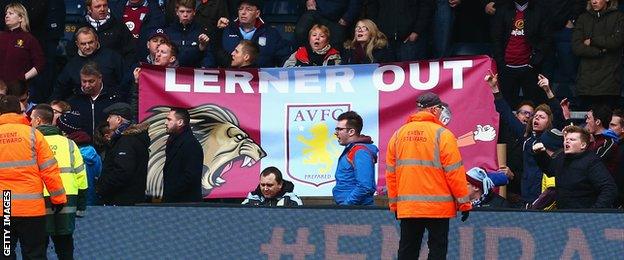
Relegation to the Championship is likely to hamper Randy Lerner's attempts to sell Aston Villa
Villa's American owner is a distant and disconnected figure, rarely seen at games and still searching for a buyer for the club after putting it on the market 20 months ago.
He has become increasingly unpopular as Villa remain rudderless, that white flag of Premier League surrender effectively waved since the inaction and inertia of that January transfer window.
Lerner has been shuffling Villa's boardroom around, inviting quips about deckchairs and the Titanic - and Villa fans will need to see hard evidence of progress before they regard it as anything else.
West Midlands businessman Steve Hollis is now chairman, while former FA chairman David Bernstein and ex-Villa striker and manager Brian Little have joined a revamped board. Former governor of the Bank of England Mervyn King is also a director while former FA executive Adrian Bevington has been working with the club.
Lerner's presence remains a problem, however, because he wants to sell, but the shortage of takers means he is stuck in a loveless marriage at a club for which he once had such high ambitions.
Lerner agreed his purchase of the club from Sir Doug Ellis, external for £64m in August 2006 and estimates of his asking price range from between £150m to £200m, but there are no potential buyers in sight and relegation will surely drive away any big-money interest.
"When you have owners who are looking to sell and the results on the pitch aren't going well, it leaves a distaste about things," added Taylor.
"The owners at the moment haven't been able to sell and I don't think that they are going to get the money they're asking. Would a potential buyer risk a lot of money on a club in the Championship? I don't think so."
So it seems, through thin and thin, Villa's fans and Lerner are currently stuck with each other.
What next for Villa?
BBC Sport's Pat Murphy: "You didn't have to be a latter-day Nostradamus to see this coming. For the past six seasons Villa have lurched between five managers and two chief executives - directionless, with no defined strategy as the owner Randy Lerner become more and more detached from the club.
"But make no mistake. Lerner still has the final say on funds until he finds a buyer. The revamped board and creation of a four-man football board is on that basis simply cosmetic.
"Key decisions via the football board chairman David Bernstein will go to the club board chairman Steve Hollis, who then has to look across the Atlantic to be sanctioned. Unwieldy and time-consuming with the lifeblood of decision-making still coagulating.
"Would traditional managers like David Moyes, Nigel Pearson, Mick McCarthy or Steve Bruce want to be bothered by all that complexity? All they'd want is to establish a direct line with the owner to get decisions made swiftly. The calibre of the next chief executive will be vital too.
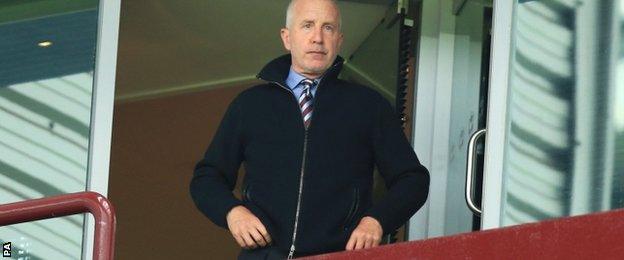
Lerner has been in charge of Aston Villa for the past decade
"The appointment of a new manager is the biggest decision to be made at Villa Park since Graham Taylor breezed in 29 years ago, making it clear to then-chairman Doug Ellis where the boundaries lay. It's asking an enormous amount of the new man to turn around the squad and playing philosophy inside a couple of months before grim reality sets in with the Championship slog.
"This current group of underachievers would struggle in the 46-game season that starts this August. I would only keep Ciaran Clark (and make him captain), Ashley Westwood, Jordan Ayew, Idrissa Gana, Rudy Gestede, Jack Grealish - and bring along promising youngsters such as Jordan Lyden, Andre Green, Keinan Davis and Lewis Kinsella.
"At least that lot would run around and look as if playing for Aston Villa meant everything to them. You couldn't say that about this current squad.
"It's fantasy to assume a revamped Villa squad could challenge for the Championship title at such short notice. A period of sober, humble realism is long overdue at the club. Just stop the rot, then restore pride and stabilise the slump. And hope that Lerner at last sells up.
"Villa need a constant visible presence there at the top - like a Peter Coates, Bill Kenwright or Jeremy Peace. Or - whisper it gently - a Doug Ellis of yesteryear."
The worst season to go down?
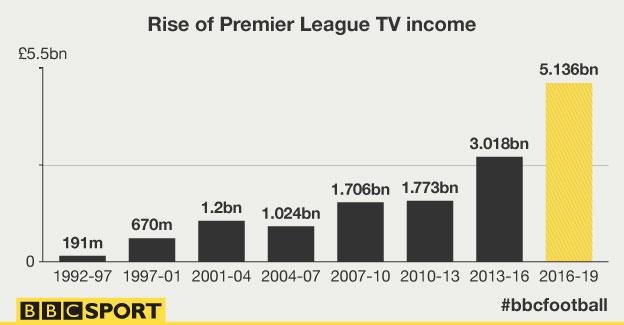
There is never a good season to get relegated - but with vast riches about to float into the Premier League as a result of a new TV rights deal next season, a departure now will be acutely painful in football and financial terms.
The Premier League announced the new deal, worth a record £5.136bn, in February, a 71% rise on the last agreement.
It means that even the club that finishes bottom of the Premier League in 2016-17 will pocket £99m and the champions will earn more than £150m, even before additional fees are paid to clubs that stage more TV matches than others.
The vast majority of the Premier League clubs could break into the top 30 richest in the world as a result - Villa are going to miss out.
Another version of this feature was published on 29 March after Remi Garde's departure.
- Published16 April 2016

- Published11 April 2016

- Published11 April 2016
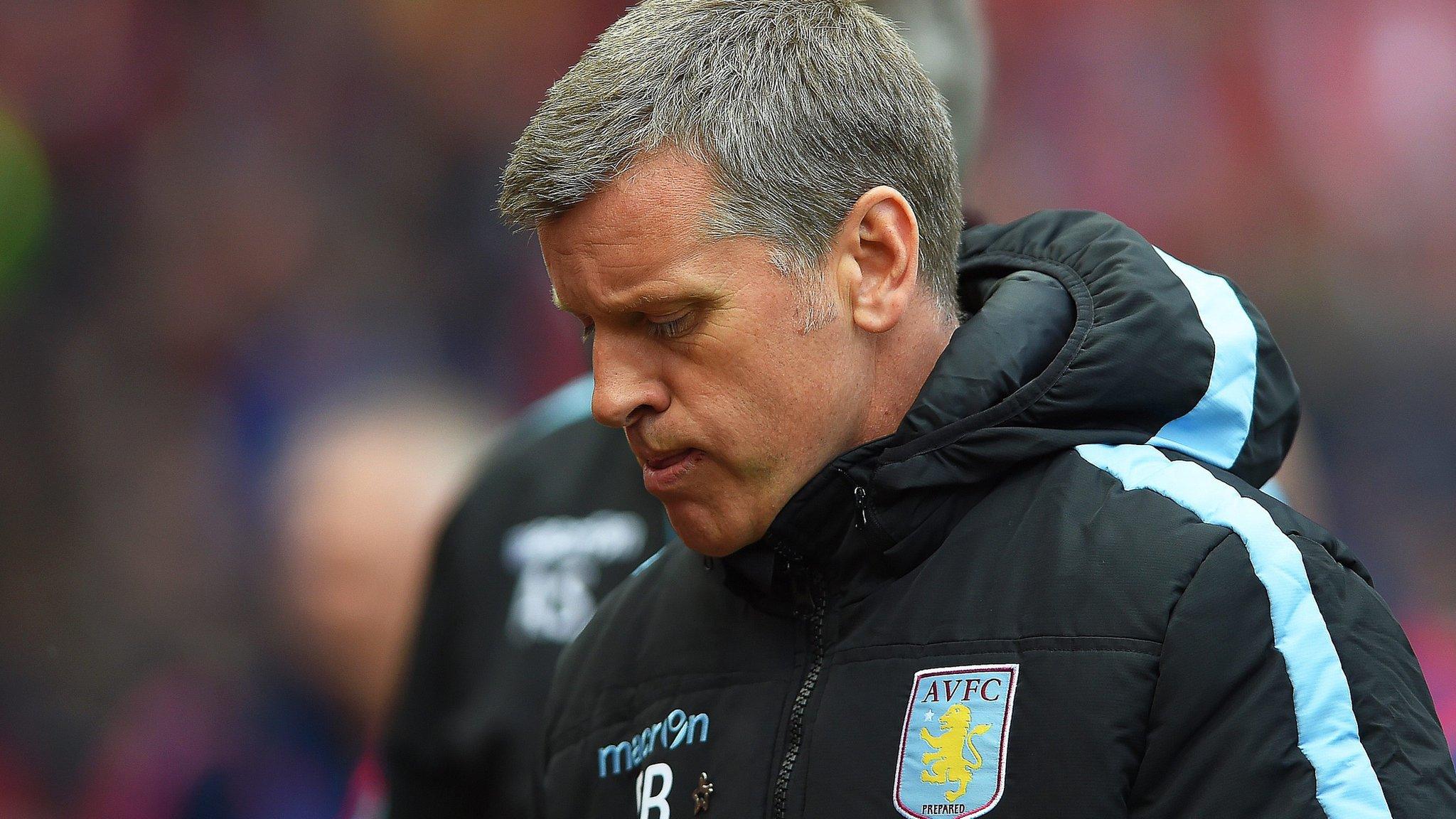
- Published29 March 2016
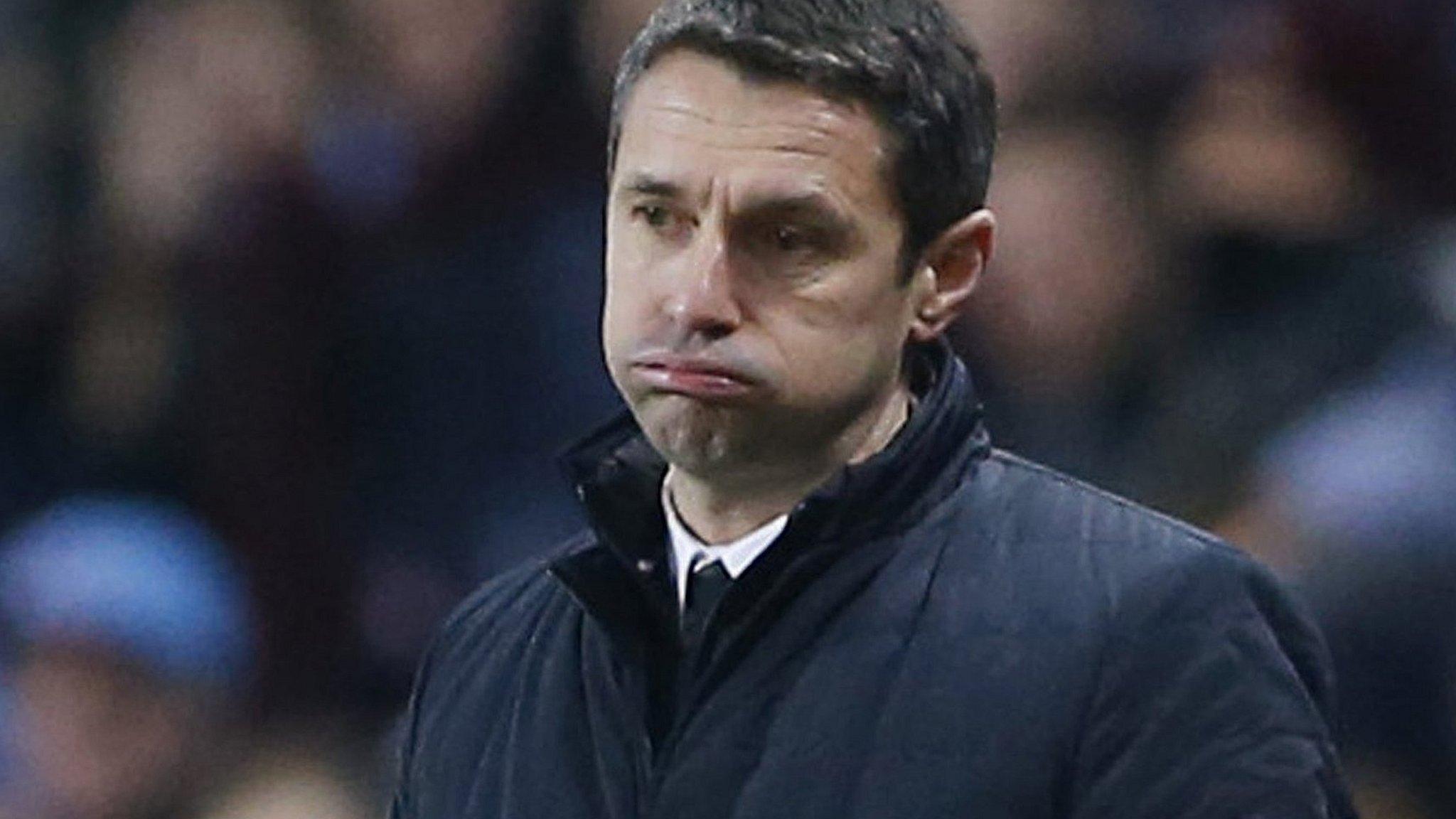
- Published20 June 2016

- Published7 June 2019
